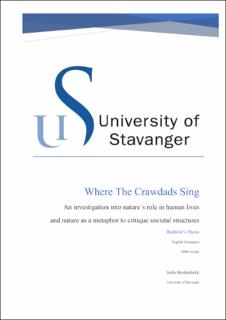| dc.contributor.advisor | Drangsholt, Janne Stigen | |
| dc.contributor.author | Bredenbekk, Sofia | |
| dc.date.accessioned | 2023-06-28T15:51:14Z | |
| dc.date.available | 2023-06-28T15:51:14Z | |
| dc.date.issued | 2023 | |
| dc.identifier | no.uis:inspera:146730262:65151143 | |
| dc.identifier.uri | https://hdl.handle.net/11250/3074031 | |
| dc.description.abstract | Hensikten med dette essayet er å gjøre en nærlesing av Where the Crawdads Sing (2018) av forfatteren Delia Owens, med fokus på bruken av naturen i romanen. I denne forbindelse har jeg pekt på skildringen og viktigheten av naturen som brukes til å kaste lys over kulturkritikk og menneskelig atferd. Et stort fokus har vært på at naturen skal brukes som metafor for menneskets tilstand, det har i ettertid vært fokus på å undersøke forholdet mellom mennesket, kulturen og naturen i romanen.
Avhandlingen min har tatt opp disse spørsmålene via en økokritisk tilnærming, med særlig fokus på det psykoanalytiske og feministiske perspektivet i forhold til naturen, og hvordan dette avdekker elementer av kulturkritikk som er tilstede i romanen. Jeg har brukt ulike vitenskapelige artikler og kritikere som referanse, som professor Jonathan Bate og hans bok Song of the Earth (2000) og Cheryll Glotfelty med hennes bidrag til teorien med: The Ecocriticism reader: Landmarks in Literary Ecology (1996). Jeg har brukt disse i samsvar med den økokritiske tilnærmingen, for å vise leseren hvordan naturskriving har blitt brukt for å problematisere menneskets tilstand og menneskets psyke. Mer spesifikt hva nærlesninger fra romanen, foretatt fra dette perspektivet, kan avsløre for oss. | |
| dc.description.abstract | The purpose of this essay is to do a close reading of Where the Crawdads Sing (2018) by author Delia Owens, focusing on the use of nature within the novel. In this regard I have pointed to the depiction and importance of nature used to shine light on cultural critique and human behaviors. A large focus has been on nature being used as a metaphor for the human condition, there has subsequently been a focus on examining the relationship between the human, culture and nature within the novel.
My thesis has undertaken these questions via an ecocritical approach, with a particular focus on the psychoanalytical and feminist perspective in relations to nature, and how this reveals elements of cultural critique present in the novel. I have used various scientific articles and critics for reference, such as Professor Jonathan Bate and his book Song of the Earth (2000) and Cheryll Glotfelty with her contribution to the theory with: The Ecocriticism reader: Landmarks in Literary Ecology (1996). I have used these in accordance to the ecocritical approach, to show the reader the ways in which nature-writing has been used to problematize the human condition and human psyche. More specifically what close-readings from the novel, undertaken from this perspective, can reveal to us. | |
| dc.language | eng | |
| dc.publisher | uis | |
| dc.title | Der krepsene synger: En granskning av naturens rolle i menneskets liv, og naturen som en metafor for å kritisere samfunnsmessige strukturer | |
| dc.type | Bachelor thesis | |
